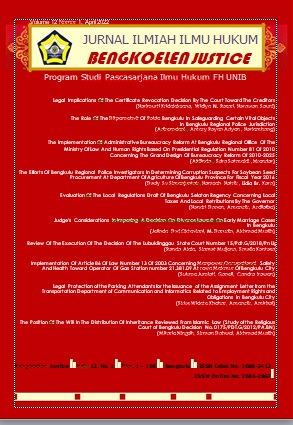Main Article Content
Abstract
In 2018, there was a lawsuit filed by Asbiati and Murisa Binti Nang Agus as the Plaintiffs against PT. Buana Sriwijaya Sejahtera (PT. BSS) as Defendant I, Plantation Cooperation of Tritunggal Jaya as Defendant II, Regent of Musi Rawas Utara as Defendant III, and Village Head of Biaro Lama as Co-Defendant that was submitted to the Lubuklinggau District Court and had been decided in Decision Number: 15/ Pdt. G/2018/PN.Llg In the course, this decision could not be executed. This study discusses the reasons for the Lubuklinggau District Court Decision Number 15/Pdt.G/2018/PN.Llg which has permanent legal force (inkracht van gewijsde) cannot be executed, as well as discussing the obstacles to the execution of the Lubuklinggau District Court Decision Number 15/Pdt.G/2018/PNLlg. Execution is the implementation of a Court Decision which has permanent legal force (in kracht van gewijsde) which is carried out forcibly by the District Court where the parties file a lawsuit caused by the losing party in the case rejecting to comply with and to carry out the Court's Decision. The approach used in this study was a normative juridical approach. This study used secondary data obtained from primary and secondary legal materials. The results of this study describe a decision that cannot be executed because there is no argument in the Plaintiffs' lawsuit that places a confiscation of collateral (conservatoir beslaag), and confiscation of execution (excekutorial beslaag) for a decision that has permanent legal force (inkracht van gewijsde), so that the decision does not have executive power. While the obstacles that arise are in the form of the absence of a time limit that serves as a guide for the Head of the Lubuklinggau District Court to carry out and determine an execution of a decision, and the resistance by the executed party who does not want to voluntarily carry out the contents of the judge's decision.
Keywords
Article Details
References
- Books
- Budiono Kusumohamidjojo, Teori Hukum Dilema Antara Hukum dan Kekuasaan, Cetakan II, Penerbit Yrama Widya, Bandung, 2017
- HB, Durin. 2002, Kebijaksanaan Agraria/Pertanahan Masa Lampau, Masa Kini, dan Masa Mendatang Sesuai dengan Jiwa dan Roh UUPA, termuat dalam Buku Reformasi Pertanahan, CV. Mandar Maju, Bandung
- Effendie Bahtiar, Tasmin Masdari, dan Chodari A., 1999, Surat Gugat Dan Hukum Pembuktian
- Dalam Perkara Perdata, Bandung: Citra Aditya Bakti.
- E.L, Fakhriah. 2013. Bukti Elektronik dalam Sistem Pembuktian Perdata. Cetakan ke-2 Bandung: PT Alumni.
- Wiryani Fifik. 2018. Hukum Agraria Konsep dan Sejarah Hukum Agraria Era Kolonial Hingga Kemerdekaan, Setara Press Malang.
- Ghazali Kurniawan, 2013, Cara Mudah Mengurus Sertifikat Tanah, Jakarta, Kara Pena. M Yahya Harahap. 2013, Hukum Acara Perdata, Cetakan ke 13, Sinar Grafika, Jakarta. Freddy Haris, 2017, Notaris Indonesia, Cetakan Kedua, Lintas Cetak Djaja, Jakarta
- IJ. Rudi, Emelia Kontesa, API. Rizkika, 2020, Pengantar Hukum Agraria Teori dan Praktik, Cetakan Kesatu, Refika Aditama, Bandung
- Johan Bahder Nasution, 2008, Metode Penelitian Ilmu Hukum, Mandar Maju, Bandung
- M. Yahya Harahap, 2014, Ruang Lingkup Permasalahan Eksekusi Bidang Perdata, Jakarta : Sinar Grafika.
- Mochammad Djais, 2000, Pikiran Dasar Hukum Eksekusi, Semarang : Fakultas Hukum Universitas Diponegoro
- Munir Fuady, 2020, Teori Pembuktian Pidana dan Perdata, Citra Aditya Bakti, Bandung,
- Sahnan, 2016, Hukum Agraria Indonesia, Setara Press, Malang.
- Soerjono Soekanto, 2008. Pengantar Penelitian Hukum, Jakarta, UI-Press
- Sudikno Mertokusumo, 2002. Hukum Acara Perdata Indonesia, Edisi enam, Yogyakarta: Liberty.
References
Books
Budiono Kusumohamidjojo, Teori Hukum Dilema Antara Hukum dan Kekuasaan, Cetakan II, Penerbit Yrama Widya, Bandung, 2017
HB, Durin. 2002, Kebijaksanaan Agraria/Pertanahan Masa Lampau, Masa Kini, dan Masa Mendatang Sesuai dengan Jiwa dan Roh UUPA, termuat dalam Buku Reformasi Pertanahan, CV. Mandar Maju, Bandung
Effendie Bahtiar, Tasmin Masdari, dan Chodari A., 1999, Surat Gugat Dan Hukum Pembuktian
Dalam Perkara Perdata, Bandung: Citra Aditya Bakti.
E.L, Fakhriah. 2013. Bukti Elektronik dalam Sistem Pembuktian Perdata. Cetakan ke-2 Bandung: PT Alumni.
Wiryani Fifik. 2018. Hukum Agraria Konsep dan Sejarah Hukum Agraria Era Kolonial Hingga Kemerdekaan, Setara Press Malang.
Ghazali Kurniawan, 2013, Cara Mudah Mengurus Sertifikat Tanah, Jakarta, Kara Pena. M Yahya Harahap. 2013, Hukum Acara Perdata, Cetakan ke 13, Sinar Grafika, Jakarta. Freddy Haris, 2017, Notaris Indonesia, Cetakan Kedua, Lintas Cetak Djaja, Jakarta
IJ. Rudi, Emelia Kontesa, API. Rizkika, 2020, Pengantar Hukum Agraria Teori dan Praktik, Cetakan Kesatu, Refika Aditama, Bandung
Johan Bahder Nasution, 2008, Metode Penelitian Ilmu Hukum, Mandar Maju, Bandung
M. Yahya Harahap, 2014, Ruang Lingkup Permasalahan Eksekusi Bidang Perdata, Jakarta : Sinar Grafika.
Mochammad Djais, 2000, Pikiran Dasar Hukum Eksekusi, Semarang : Fakultas Hukum Universitas Diponegoro
Munir Fuady, 2020, Teori Pembuktian Pidana dan Perdata, Citra Aditya Bakti, Bandung,
Sahnan, 2016, Hukum Agraria Indonesia, Setara Press, Malang.
Soerjono Soekanto, 2008. Pengantar Penelitian Hukum, Jakarta, UI-Press
Sudikno Mertokusumo, 2002. Hukum Acara Perdata Indonesia, Edisi enam, Yogyakarta: Liberty.

